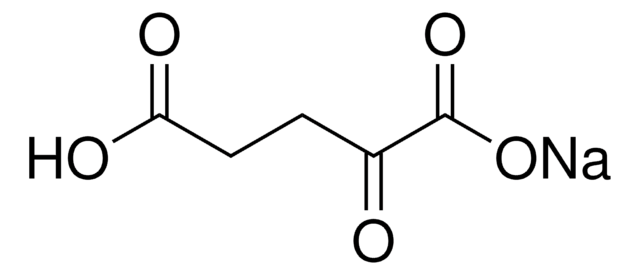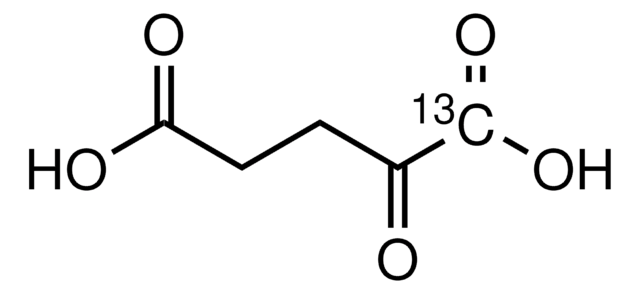K1128
α-Ketoglutaric acid
BioReagent, suitable for cell culture, suitable for insect cell culture
Sinónimos:
2-Oxoglutaric acid, 2-Oxopentanedioic acid
About This Item
Productos recomendados
product line
BioReagent
Quality Level
assay
≥98.5% NaOH basis (titration)
form
powder or crystals
technique(s)
cell culture | insect: suitable
cell culture | mammalian: suitable
solubility
water: 100 mg/mL, clear to slightly hazy, colorless to almost colorless
storage temp.
2-8°C
SMILES string
OC(=O)CCC(=O)C(O)=O
InChI
1S/C5H6O5/c6-3(5(9)10)1-2-4(7)8/h1-2H2,(H,7,8)(H,9,10)
InChI key
KPGXRSRHYNQIFN-UHFFFAOYSA-N
¿Está buscando productos similares? Visita Guía de comparación de productos
General description
Application
- as a supplement in minimum essential medium α (α-MEM) to culture primary mesenchymal stromal/stem cells (MSCs) to study its effects on age-related osteoporosis
- for chemical treatments to compare the treatment effects of several compounds on lifespan between manual and automated lifespan machine (ALM) platforms
- as a printed chemotaxis ligand to screen chemotaxis receptors with high-throughput technologies and verify the interactions with surface plasmon resonance (SPR)
Biochem/physiol Actions
signalword
Danger
hcodes
Hazard Classifications
Eye Dam. 1
Storage Class
11 - Combustible Solids
wgk_germany
WGK 3
flash_point_f
Not applicable
flash_point_c
Not applicable
ppe
dust mask type N95 (US), Eyeshields, Gloves
Certificados de análisis (COA)
Busque Certificados de análisis (COA) introduciendo el número de lote del producto. Los números de lote se encuentran en la etiqueta del producto después de las palabras «Lot» o «Batch»
¿Ya tiene este producto?
Encuentre la documentación para los productos que ha comprado recientemente en la Biblioteca de documentos.
Los clientes también vieron
Nuestro equipo de científicos tiene experiencia en todas las áreas de investigación: Ciencias de la vida, Ciencia de los materiales, Síntesis química, Cromatografía, Analítica y muchas otras.
Póngase en contacto con el Servicio técnico













